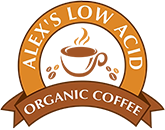Take a sip of Alex's Low-Acid Organic Coffee and experience the harmonious blend of flavors and the smoothness that it offers. You might find yourself wondering about the origins of these exquisite coffee beans. Rest assured, our coffee is sourced from the finest Arabica beans grown in different regions across the world. Whether it's Whole Bean or Ground, Regular, Decaffeinated, or Half Caff, each variety of Alex's Low-Acid Organic Coffee combines beans from the Chiapas region of Mexico, Nicaragua, and Honduras. These beans are not only 100% USDA certified organic but also guaranteed to be fresh and low in acid. Let's delve into the fascinating origins of Alex's Low-Acid Organic Coffee.
Chiapas Region: Leading the Charge from Mexico
Mexico's coffee industry faced a significant setback around a decade ago when coffee leaf rust struck. However, Mexico's coffee production has made a remarkable comeback, particularly in the Chiapas region. Chiapas, located in southern Mexico, between Oaxaca and Guatemala, boasts high altitudes and nutrient-rich soil, making it comparable to the coffee-growing regions in Guatemala. Almost half of Mexico's coffee bean exports come from Chiapas, comprising 50% of the coffee used in Alex's Low-Acid Organic Coffee. The coffee beans from Chiapas have a mild and delicate flavor profile with hints of brown sugar, ripe pears, and nutty overtones.
Nicaragua: Traditional Coffee Powerhouse
Nicaragua has a long-standing reputation as a major exporter of coffee beans. The country possesses the ideal conditions for coffee production, including moderate altitudes and volcanic, nutrient-rich soil. Coffee-growing regions in Nicaragua are well-suited for organic cultivation due to the presence of natural canopies that provide shade for the young coffee plants and natural predator control for pests. A quarter of Alex's Low-Acid Organic Coffee is sourced from Nicaragua, offering a balanced and subtle flavor profile. As you savor a cup of Alex's Low-Acid Organic Coffee, you might detect notes of hazelnut, vanilla, and citrus.
Honduras: Coffee Industry of Growing Importance
With 5% of the world's coffee production and the highest per capita coffee production, Honduras is an important player in the coffee industry. Situated in Central America, bordering Guatemala, El Salvador, and Nicaragua, Honduras also faced the challenges posed by the coffee leaf rust crisis. However, the country has shown resilience and is recovering steadily. Honduran coffee beans, with their mild and approachable flavors, account for a quarter of the coffee used in Alex's Low-Acid Organic Coffee blends. Expect hints of tropical fruits, berries, chocolate, and vanilla when you enjoy a cup of our coffee.
Basics of Coffee Production: How It Works
Let's briefly explore the journey of our coffee beans, from planting to your cup. It all begins with the planting of coffee seeds, which are protected from the sun in nurseries or shaded areas. The coffee plants require several years to grow before they can be harvested. Only the best coffee cherries are selected, and the beans are extracted from them. The beans undergo fermentation and drying, followed by sorting and removal of the hulls. Once the beans pass quality tests, they are roasted to a medium dark French Roast, bringing out a delightful chocolatey flavor that complements the other nuances in our coffee blend.
The Unique Roasting Process
What sets Alex's Low-Acid Organic Coffee apart is our roasting process, specifically designed to produce a lower acid coffee compared to other brands. Our beans are processed using convection heat, never coming into contact with hot metal. This meticulous process ensures that the resulting coffee remains lower in acid, providing a smoother and more gentle experience for our customers.
Commitment to Organic Quality
All of our coffee beans, sourced from different countries, are certified organic. This certification is a testament to our respect for the land on which the beans are grown, the farmers who cultivate them, and our valued customers. Our beans adhere to the standards and quality control guidelines set by the National Organic Program, regulated by the Department of Agriculture (USDA). From production to processing and packaging, every step is carefully monitored. The soil used for cultivation must remain free from harmful substances for years before planting, and the coffee beans must not come into contact with any pesticides, herbicides, or fungicides. Our organic decaffeinated coffee undergoes a special process called the Swiss Water Process, which uses hot water and filters to remove caffeine without the use of chemical solvents.
Experience the Finest Coffee
To have the ultimate coffee experience, it's essential to choose beans that are not only delicious but also tailored to your preferred acidity level. Alex's Low-Acid Organic Coffee combines the highest quality Arabica beans from Chiapas in Mexico, Nicaragua, and Honduras, all of which are organically grown. When you receive your package of coffee beans, you can be confident that they are fresh and provide a truly exceptional coffee experience.

